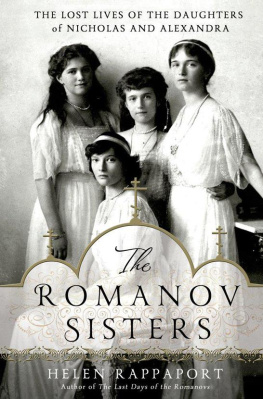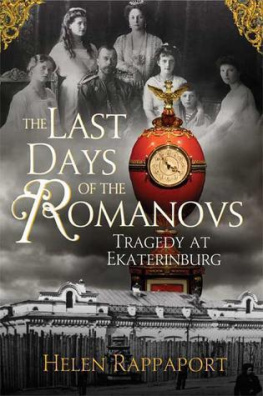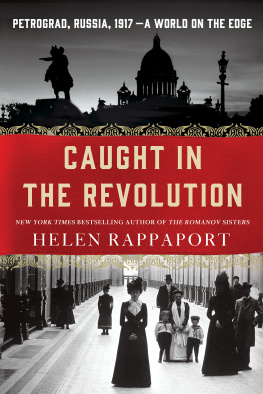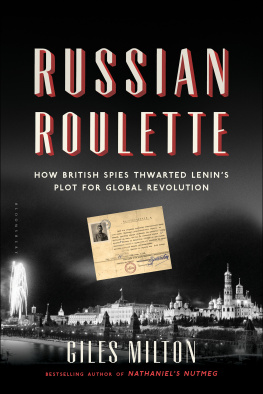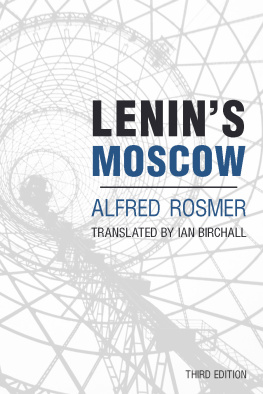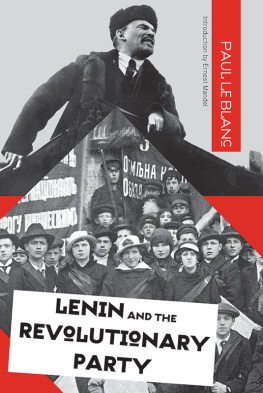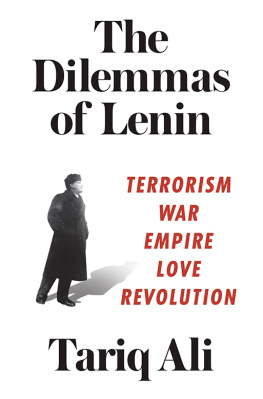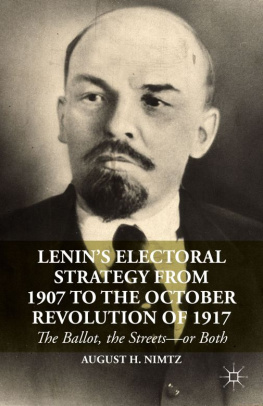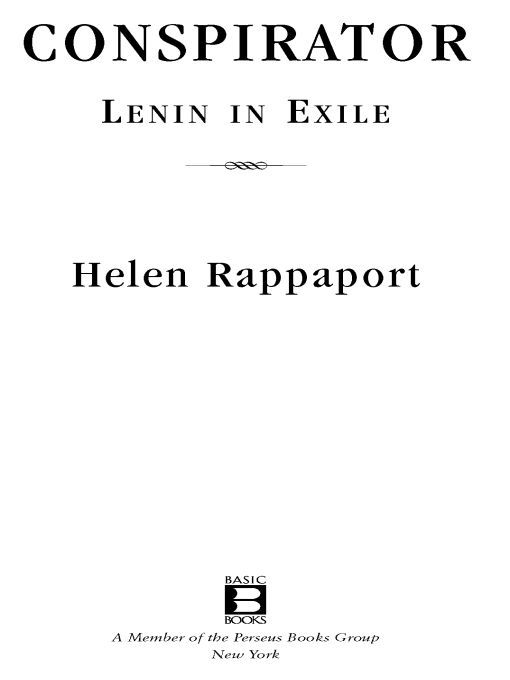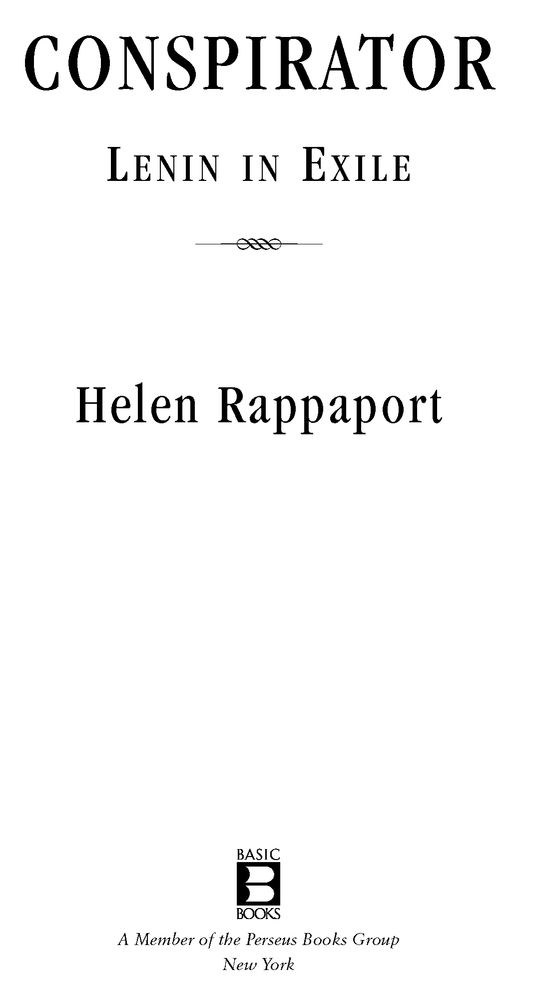Table of Contents
For Christina
POLONIUS: What do you read, my lord?
HAMLET: Words, words, words.
Shakespeare,
Hamlet, Act 2, Scene 2
INTRODUCTION
Shlisselburg Fortress, 1887
FIVE OF THEM WERE TO BE TAKEN to Shlisselburg that night, May 5, 1887the five leading conspirators in the latest foiled assassination attempt against a Russian czar. This time, only six years after revolutionaries had successfully blown up Alexander II, his son Alexander III, who had instituted a highly reactionary and oppressive government in the wake of his fathers murder, had been the target. They called themselves the Terrorist Section of The Peoples Will (Narodnaya Volya). Even though this organization had effectively been driven out of existence by widespread arrests, the Terrorist Section had nevertheless dedicated themselves to carrying forward the aspirations of The Peoples Will for the liberation of Russians from autocratic rule. They had no experience of terrorism, let alone of making bombs. As conspirators they were inept to say the least. It was only their youththe youngest was only twentyand their bungling incompetence that had saved St Petersburgs Nevsky Prospekt from yet another outrage. A spot check on two of the conspirators by suspicious police agents had uncovered the crude bomb filled with bullets dipped in strychnine that one of them carried inside a copy of Grinbergs Dictionary of Medical Terminology.
It might sound like the stuff of tragicomedy, but the plots perpetrators were in deadly earnest, even if their bomb was defective. But what had driven them to such violent action?
Russia had ever been a country of extremes, a place where the opulence and extravagance of the Imperial Court was matched by its indifference to the privation suffered by Russias silent and unseen masses. By European standards, nineteenth-century Russia was a backward country, its population largely illiterate and rural, its infrastructureroads, railways, and industrylagging far behind that of the West. In an empire covering one-fifth of the worlds surface the vast majority of Russias multinational population of 180 million (by World War I) had been enslaved by serfdom until 1861. But emancipation had done little to liberate the peasantry from illiteracy, poverty, and land hunger, or to assuage the social conscience of a growing intelligentsia that passionately sought to redress the imbalances of the old order.
Official corruption and repression in Russia drove young people to seek political answers to the questions that so tormented them about Russias position in the world. They wanted to work toward a better political and economic future, in which the peasantry and the urban proletariat would play key roles. For a while hopes were pinned on the model of the existing village communes providing a shortcut to socialism and the institution of a democratic system. But the populist To the People movement of 1873-1875an ill judged propaganda drive by the intelligentsia among the peasants of rural Russiahad collapsed amid widespread peasant mistrust of these newcomers and had ended in thousands of arrests, and exile for many to Siberia.
The response to official repression was the establishment in 1876 of Land and Freedom (Zemlya i Volya), the first political party to openly advocate political change in Russia. But before long the party was divided. Some members embraced the peaceful path of agrarian reform and worked for local government in rural areas, while in 1879 a more extreme group formed The Peoples Will faction, embracing terrorism as a political weapon. But such extreme methods were short-lived; by the time the would-be assassins were arrested in 1887 The Peoples Will was a spent force. Arrested in March, the five men were held for two months in solitary confinement in the grim Trubetskoy Bastion of the Peter and Paul Fortress in St. Petersburg. After their five-day trial in April, they were condemned to death.
The other prisoners on the isolation wing of the Trubetskoy Bastion heard the cell doors being unlocked the night the men were taken away to their place of execution; even the thick stone walls could not muffle the resonant tread of footsteps matched by the ominous clank of the chains which bound the men hand and foot. The five mens shadows flickered and fell as they passed along the dark prison walls by the light of dingy kerosene lamps and were led out across the cobbled courtyard to the iron gate. Here police vanslittle more than cages on wheelswaited for them. This would be the last time they would see the city. Just out of sight, the River Neva lapped softly along its long, flat embankment, where a steamship waited on the dark and deserted quayside, its tiny cabin windows curtaining the outside world from view.
The men were on their way to Shlisselburga forbidding medieval fortress built on a small island looking out over Lake Ladoga, thirty-five miles from St. Petersburg along the Neva. Every Russian revolutionary knew about Shlisselburg; it was the Russian Bastille and few survived incarceration there. Built in the fourteenth century by the people of Novgorod, it was later captured by the Swedes and then recaptured by Peter the Great. It had gained notoriety when Ivan VI was held and murdered there in 1764. In the 1820s it became a staging post for conspirators in the Decembrist uprising on their way to exile in Siberia. But since 1884 it had served a much more specific purpose, when a special isolation prison was built within its ancient walls for the incarceration of forty of the countrys highest security political prisoners. Shlisselburg was a place, it was said, from which people were only carried out; they very rarely walked. If they took you there it was either to hang you or because your death sentence had been commuted to life imprisonment. And life meant life. One way or another, youd die at Shlisselburg.
After the steamship had traveled for five hours, the green, iridescent waters of the River Neva suddenly broadened out into the lagoons of Lake Ladoga. Here Shlisselburg with its white walls and limestone towers loomed into view in the early dawn. At the top of a tall spire shone the gilded key that had given the fortress its German name from the word Schlussel.
As the five men passed through the high white walls of the main entrance, the huge, two-headed imperial eagle looked down on them as though ready to swoop. Inside everything seemed white and quiet and orderlylike a tiny village with its own small white church at one end. But beyond this seemingly peaceful setting there stood a two-story red brick building with dirty windows and two tall chimneysthe special wing for political prisoners. Inside, the poorly lit first and second floors were divided by a net to prevent suicide attempts from the top floor; connecting the two levels from one side to the other, there was a narrow walkwaya Russian Bridge of Sighs.
Ranged around the circumference were forty black iron doors opening into forty isolation cellsset like a row of coffins standing on end, for incarceration here was a living deathwith only the fuzzy outline of the far horizon beyond each cells opaque windowpane. Inside there was nothing but the overpowering stillness of solitary confinementwhere the real becomes unreal and the imaginary can become so vivid that it takes on a life that confuses the senses and drives men mad. The only sound breaking the silence was the hissing of water in pipes somewhere far below, or, from the distance, a faint tubercular cough of another prisoner. Sometimes there was the soft tap-tap of prisoners communicating with each other by an improvised code. And sooner or later, the rattle at the door, as the gendarme slid open the peephole.


